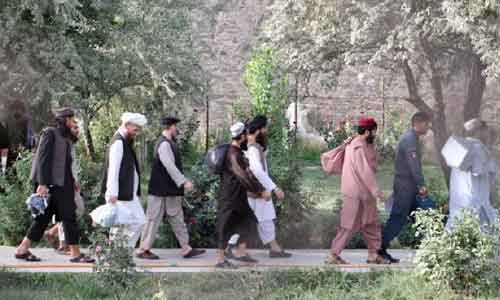Although the Loy Jirga decision about release of 400 dangerous Taliban prisoners created some hopes and optimism about ending war in the country, there are many ambiguities and challenges which not promise a clear outlook for peace in the country. In fact, it would be naïve to be optimistic about peace despite so many challenges and questions which remained unanswered yet. Even, there is no certainty if the releases of dangerous prisoners worsen or improve the condition. Therefore, the release of 400 dangerous Taliban prisoners will not be all obstacles of peace process which have been removed through Loy Jirga. Recently, the president also made it clear that the peace process is still in serious ambiguity. Now, the question is what ambiguities are there in this peace process?
As the nature of war and conflict is complicated in Afghanistan, it has also multiple roots and factors inside and outside the country. The first major challenge is the ideological nature of the Taliban. The Taliban group has an extremist and fundamentalist religious nature which justifies any act of terror and violence. The Taliban still insist on establishing the Islamic Emirate and have never shown flexibility in this regard. The ideology of Taliban is entirely on contrast to manifestation of modern values and so there is no reconciliation between Talibanism and new civilization rooted in the Western countries. This feature of the Taliban indicates that either everyone agrees to establish the Islamic Emirate or continue to be on the battlefield with this group. However, no ordinary Afghan citizen favors war and bloodshed because no one has benefited from war and violence except the mafia and terrorist groups.
The second challenge links to ambiguous strategy of the United States in south Asian countries including Afghanistan. If we look at the past, sometimes it fought against the extremist and terrorist groups but other times showed flexibility against them which led to their enhancement. Now, there is a serious question in public opinion of Afghan people and even all Muslim people if the United States fights against terrorism or plays with it. It is said that the frequent contacts of the US officials with Taliban leaders and their secret agreements with the group led to enhancement of Taliban. In most recent case, the US Secretary of State spoke with Mullah Baradar who may have had a secret agreement between the two countries. On the other hand, in past two years, the United States has been pressing the legitimate government of Afghanistan to comply with the Taliban’s illegal and ambitious demands even before the start of inter-Afghan talks. Beside this, it is largely believed the Afghan peace process is victimized by the upcoming US election. Everyone knows that the US presidential election is going to take place few months later, and that the current leadership of the United States wants to make an artificial achievement in Afghanistan. Hereon, it produces a third challenge which is the erosion of Afghanistan’s current political system and the deepening of public distrust on it.
The release of thousands of Taliban fighters through an urgent consultative peace Jirga by the government is a sign of this problem. We must acknowledge that no Taliban or no terrorist should have been released from prisons without trial and punishment. However, the agreement which has been signed between the United States and the Taliban imposes no legal obligations on the Afghan government. On the other hand, when 400 people have been sentenced because of committing worst crimes against humanity, no law or institution, including the Loya Jirga, has the right and competence to release them. These issues have not only raised important questions in public opinion but also raised the wall of distrust between the government and Afghan people.
The next major challenge is expansion of war in the country’s borders. Unfortunately, the country’s borders, especially in areas where there are transit and trade activities, the problems are increasing and the borders are becoming more insecure. It seems that neighboring countries and in some cases the Mafia groups lie behind these border challenges. This not only strengthens the Taliban but also complicates the whole situation and ultimately affects the peace process and intra-Afghan negotiations. The frequent attacks such as the attack on Nangarhar prison seems to be carried out by cross-border elements. In such a situation, the Taliban are not willing to cease fire or reduce the violence and on the other hand the government cannot enter into negotiations with this group with hope and optimism. Thus, the people of Afghanistan cannot accept to make peace agreement with a group that never stop killing of civilians and destruction of the country’s infrastructure.
The last challenge links to ambiguous policy of the regional countries. It seems that the interests of regional countries also linked with the survival of the Taliban and other extremist groups. The fiscal and political supports which have been provided to Taliban in recent years indicate a kind of secret relationship with the group. In fact, only some of these challenges are enough to damage the intra-Afghan negotiations. Finally, it is highly expected from all the stakeholders to play its constructive role in the upcoming Intra-Afghan talks and end of war in the country. Given the geo-economic location of Afghanistan, a peaceful and extremist-free Afghanistan will be in the interests of all parts while no country has ever benefited from survivals of terrorists and war in this country.
Home » Opinion » The Ambiguity and Challenges of Peace Process in Afghanistan
The Ambiguity and Challenges of Peace Process in Afghanistan
| Mohammad Zahir Akbari

